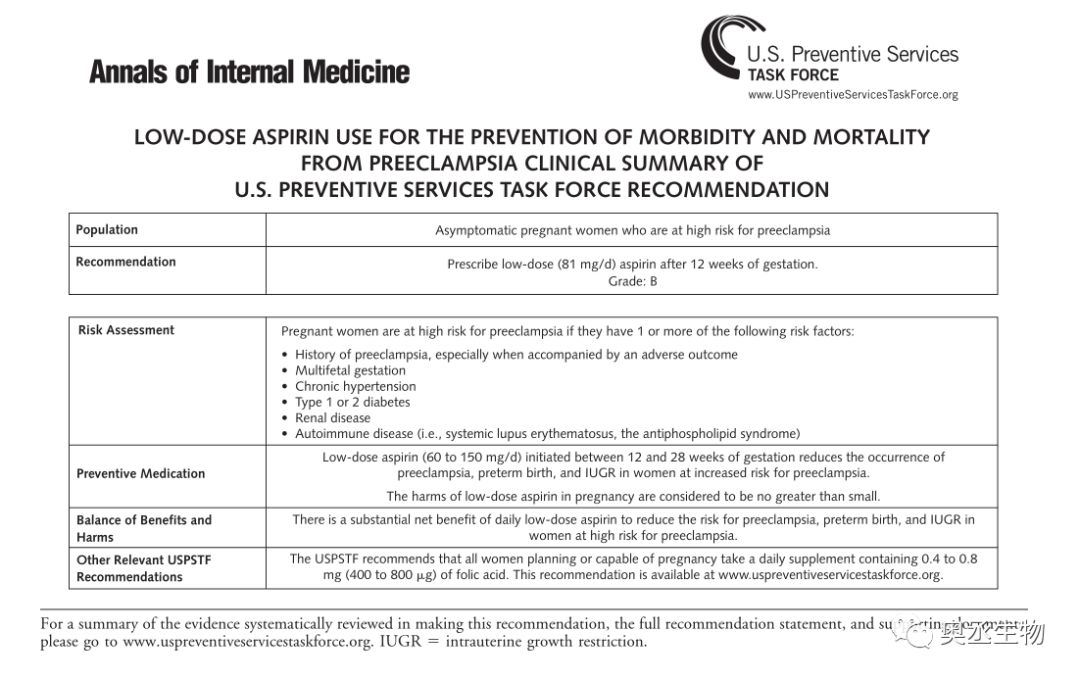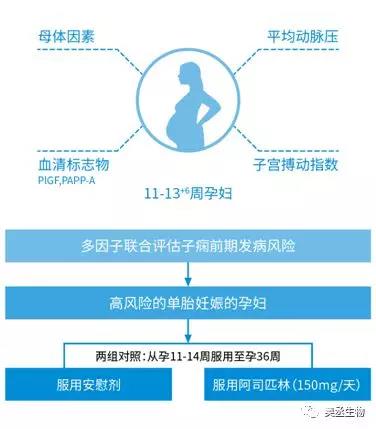Preeclampsia is a kind of hypertension in pregnancy and one of the serious complications of obstetrics. The incidence of preeclampsia in pregnancy is 2% to 8% [1], global preeclampsia causes 15% of preterm births, and 43% of pregnant women's deaths are caused by preeclampsia [2]. At present, there is no clinically effective treatment for preeclampsia, and the basic treatment is still termination of pregnancy and placental delivery.Therefore,Move the focus of preeclampsia management forward to assess the risk of preeclampsia in pregnant women in advance,preventive medication is of great significance.


In recent years, the application of low-dose aspirin in the prevention of preeclampsia has received more and more clinical recognition.
As early as 2014, the United States Preventive Services Task Force (USPSTF) has published guidelines recommendationsTake low-dose oral aspirin to prevent preeclampsia in high-risk pregnant women,The article pointed out that for those with high-risk factors, low-dose aspirin (ranging from 60-150mg/d) can reduce the risk of preeclampsia by 24%, the risk of pre-eclampsia by 14%, and the risk of fetal growth restriction by 20% [3].
The National Institute of Health and Clinical Optimization (NICE) and the Society of Obstetricians and Gynecologists of Canada (SOGC) also issued guidelines and recommendationsFor high-risk preeclampsia pregnant women, start preventive use of aspirin before 16 weeks of gestation until delivery.At the same time, studies have shown that the beneficial effects of low-dose aspirin are consistent, regardless of whether treatment is started before or after 16 weeks of pregnancy [4].


The New England Journal of Medicine (NEJM) published a study in August 2017. In a multi-center, double-blind, placebo-controlled trial, the British Fetal Medicine Foundation (FMF) combined maternal factors and used PLGF and other indicators to screen 1776 eligible preeclampsia from 11-14 weeks of pregnancy. High-risk pregnant women, and half of the pregnant women received 150mg/d aspirin treatment.
Experimental results showed that the intervention rate of aspirin for early-onset preeclampsia (<34 weeks) was 82%, and the intervention rate for late-onset preeclampsia (<37 weeks) was 62%.Aspirin can effectively reduce the risk of preeclampsia in high-risk pregnant women [5].


A large amount of evidence-based medical evidence shows that,For high-risk pregnant women with preeclampsia, the use of low-dose aspirin for preventive medication can effectively reduce the incidence of preeclampsia.Therefore, it can be combined with PLGF and other indicators to assess the risk of preeclampsia in pregnant women, and the targeted use of aspirin can avoid unnecessary medication, better improve the intervention rate, extend the gestational week, and better protect the health of mothers and babies.











